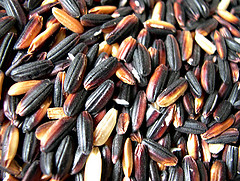There’s an important post entitled Vegetables of Mass Destruction over at The Daily Kos, a blog. Important not so much for the content, most of which is familiar, well-meaning and just a tad parochial, but for the location. The Daily Kos is one of the most popular sites in the blogosphere, averaging around half a million visits a day. If just some of those readers go away with a slightly better appreciation of the value of agricultural biodiversity, that will be A Good Thing. So thanks to cookiebear and The Daily Kos for their support.
(Useless) friends in high places
No less a gardener than Prince Charles (of England) does not like the EU seed marketing legislation, and admits that he could be considered a criminal for saving and distributing unregistered varieties. I have not seen any comments from him on the proposals for the future. But his opinion carries not the slightest bit of weight with the regulators, I promise. I wonder whether he has seen my own modest proposal? Probably not.
Bee problems caused by monoculture?
The New York Times picked up the Bees in Peril story and amplified it considerably. More interesting still, over at Resilience Science Garry Peterson points out that maybe the decline in pollinators is linked to the fact that introduced European bees have displaced natural populations to such an extent, and that the bees are now more genetically uniform. Sounds like he could be right.
Very diverse barley discovered … and already under threat?
SciDev.net reports on a paper in Theoretical and Applied Genetics that identifies the world’s most genetically diverse barley varieties. SciDev.net and other press reports focus on the high diversity of the barleys, found growing in farmers’ fields around the captial city of Asmara in Eritrea, as a source of potentially valuable material for improving tropical varieties worldwide. They point out, too, that the populations are threatened by urban development and that Eritrea has no genebank in which to protect them. But does Eritrea really need its own genebank, or have they more pressing priorities? A researcher from ICARDA, which has a perfectly serviceable genebank, was on the team. The International Treaty on Plant Genetic Resources for Food and Agriculture guarantees free access to the material if stored there. Eritrea was one of the first signatories of the Treaty. What’s the problem?
More interesting, perhaps, is a part of the paper that the reports I read neglected to mention. The molecular analysis indicates that the Horn of Africa may be where barley was first domesticated. That honour usually goes to the Fertile Crescent, with the Horn a “secondary centre of diversity”. But Eritrean and Ethiopian barley may actually have been domesticated independently.
Thai rice on the genebank menu
 There was a slightly odd article at Seed Magazine a little while back on Thailand’s efforts to conserve almost extinct varieties of rice in its genebank. Odd because while the story is familiar enough in this kind of piece, the details are slightly confused (or confusing). But no matter, that’s probably only of concern to a pedant like me. The rest of you won’t worry about statements like “farmers across Asia once grew more than 100 varieties of rice, but now that number is down to only 20 or 30 of the most productive types”. Instead, you’ll be thrilled to know that the Thai national collection houses nearly 24,000 varieties, 17,000 of which “are in danger of dying out because they are no longer grown by Thai farmers”. That’s great because SINGER, a window on the world of genebank accessions, lists only 5982 samples from Thailand. Maybe one of those is “the fragrant Pin Kaew variety that was named the best rice in the world at a competition in 1966 but which has since disappeared, having lost out to more productive varieties”.
There was a slightly odd article at Seed Magazine a little while back on Thailand’s efforts to conserve almost extinct varieties of rice in its genebank. Odd because while the story is familiar enough in this kind of piece, the details are slightly confused (or confusing). But no matter, that’s probably only of concern to a pedant like me. The rest of you won’t worry about statements like “farmers across Asia once grew more than 100 varieties of rice, but now that number is down to only 20 or 30 of the most productive types”. Instead, you’ll be thrilled to know that the Thai national collection houses nearly 24,000 varieties, 17,000 of which “are in danger of dying out because they are no longer grown by Thai farmers”. That’s great because SINGER, a window on the world of genebank accessions, lists only 5982 samples from Thailand. Maybe one of those is “the fragrant Pin Kaew variety that was named the best rice in the world at a competition in 1966 but which has since disappeared, having lost out to more productive varieties”.
flickr photo by Stef Noble used under a Creative Commons license. Purple Sticky Rice is rare, but not that rare.